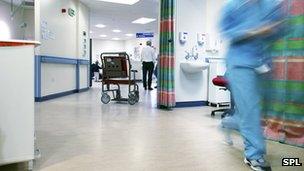Stafford Hospital: Five more hospital trusts to be investigated
- Published

Five hospitals in England are being investigated after the reporting into failings at Stafford Hospital
Five other hospitals trusts are to be investigated in the wake of the public inquiry into failings at Stafford Hospital.
Neglect and abuse at the hospital led to hundreds of unnecessary deaths between 2005 and 2008.
In response to the inquiry, Prime Minister David Cameron announced that five other hospitals with persistently high death rates would be investigated.
All the trusts named have had high rates for two years.
They are Colchester Hospital University NHS Foundation Trust, Tameside Hospital NHS Foundation Trust, Blackpool Teaching Hospitals NHS Foundation Trust, Basildon and Thurrock University Hospitals NHS Foundation Trust and East Lancashire Hospitals NHS Trust.
Death rates are calculated by looking at the number of people that would be expected to die when taking into account the age and disease profile of the local population.
High death rates were one of the factors that triggered the original investigation into Stafford Hospital. While not necessarily proof there is a problem, they are a "smoke alarm" suggesting there could be.
The figures for the five hospitals were already known about within the NHS, external and were being monitored
However, the intervention has been ordered amid mounting concern about levels of care.
Speaking in the Commons, Mr Cameron said: "I have asked the NHS medical director, Prof Bruce Keogh, to conduct an immediate investigation into the hospitals with the highest mortality rates and to check that urgent remedial action is being taken."
Prof Keogh said: "Each of the hospitals we identify today is already under scrutiny by regulators.
"This clinically led and practical investigation will allow me to assure myself, Parliament and patients that these hospitals have everything they need to improve."
'Reform'
The long-awaited report into failings at Stafford Hospital produced 290 recommendations aimed at "fundamental change" to prevent the public losing confidence in the health service.
The inquiry chairman, Robert Francis QC, described events at the hospital as "appalling and unnecessary" which led to hundreds of people suffering and had "betrayed" the public's trust in the NHS.
He recommended that units that failed to adhere to basic standards of care should be prevented from providing services, and if those failings had led to death or serious harm to patients legal sanctions were appropriate.
NHS staff should also face prosecution if they hid information about poor care and should be compelled to be open with patients about mistakes.
He also recommended:
The merger of the regulation of care into one body - two are currently involved
Senior managers to be given a code of conduct and the ability to disqualify them if they are not fit to hold such positions
An increased focus on compassion in the recruitment, training and education of nurses, including an aptitude test for new recruits and regular checks of competence as is being rolled out for doctors
He said failings went right to the top of the health service saying the Department of Health was too "remote" and focussed on "counterproductive" reorganisations.
The hospital trust, local GPs and MPs and the Royal College of Nursing were also criticised.
The government's full response to the public inquiry will come next month, however, it has already been announced that a new post of chief inspector of hospitals will be created in the autumn.
Speaking in the House of Commons, David Cameron said he was "truly sorry" for what happened at Stafford Hospital, which was "not just wrong, it was truly dreadful" and the government needed to "purge" a culture of complacency.
Robert Francis QC delivers his statement, saying: "This is a story of appalling and unnecessary suffering of hundreds of people"
There has been anger from some quarters after nobody lost their jobs as a result of the public inquiry.
James Duff's wife Doreen died in the hospital. He said: "Not one person has lost their job over this - instead they have been promoted and some people have been moved sideways.
"This has been a disaster yet nobody is accountable."
Sir David Nicholson has been the focus of anger from families affected by the scandal. He is chief executive of the NHS and was briefly in charge of the Regional Health Authority while death rates were high at Stafford Hospital.
Responding to calls for him to go, he said: "I think it's perfectly understandable, I understand the anger that they feel, the upset that they feel about the treatment of their loved ones in Mid-Staffordshire hospital.
"I absolutely understand all of that. At the time I apologised and in a sense I apologise again to the people of Stafford for what happened, but apologies are not enough.
"We need action, we need to make things happen."